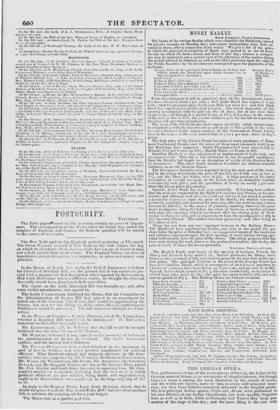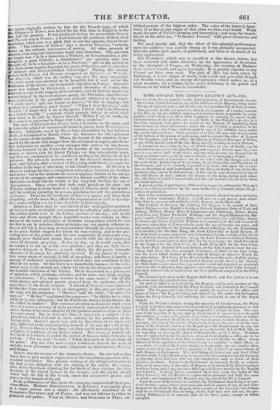THE GERMAN OPERA.
Tine performance of one of the masterpieces of GLUCK, the father of the German musical drama, is an occurrence of singular interest; for though Gusen's name is among the most illustrious in the annals of music, and his works are known, more or less, to every well-educated musi- cian, yet they have hitherto remained unknown to the English public. His two principal Italian operas, Orfro and Aleeste, were performed in his own lifetime at our Italian Operahouse, but were speedily forgotten here as well as in Italy, while in Germany and France they keep pos- session of the stage to this day ; and the same thing is the case with the operas originally written by him for the French stage, of which the lphigenin ni Twirls, now heard for the first time in England, is the last and the greatest. It was produced during the memorable Oixen and PICCISI war in France ; a feud between the partisans of these rival musicians, which rose to a pitch that in our day appears almost incre- dible. " The violence of faction," says a mnsical historian, " actually broke up the ordinary intercourse of society. All other grounds of discord, even religious intolerance itself, were forgotten. The question no longer was---4 Is he a Jansenist, a Molinist, an Eneyelopiedist, a phi- losopher, a good Catholic, a freethinker ? ' on question only was thought of, 'Is he a Cluckist--is he a Piccinist ? ' and on the answer to ibis momentous inquiry depended the pence of families, and the duration .spf intimate and long-established friendships." Dining tins stormy s period, both GI.rer: and Poxasa composed an /phise,eie en '71s/trick; ;Slut (Ihree'e, which was the earlier, was also the inure successful. • e'Pleelsi.'s lmisic was admitted to be beautiful, but it sank muler the : feebleness of the drama—an insuperable objection in -F rance. Crxeie's poem was written by Guitheno, a young dramatist of genius, who adhered closely to the tragedy of EURIPIDES ; and its literary merit was ackno•.vledged by the most zealous among the Piccinists, who likewise bore testimony to the powerful and dramatic character of the music. " I don't know," said the Baron ini Gams's!, "if this is singing; but perhaps it is something, much better." " When I hear lphig&lie," adds Geresi, " I. forget that I am at the opera; I think that 1 am listening to a Greek tragedy : " a remark which strongly brings to iniod whet }vas wont to be said by GLUCK himself, "Before I set to work, itiy first care is to endeavour to forget that I am a musician." 'Ille story of lphigenia has alwes•s been a favourite on the stage, and it forms the subject of innumerable dramatic pieces, from Erni l'e oes to , 11 Ac IN E. lphigenia, saved by Diaim from immolation by her father at Aulie, is trnnsported to Tauris, where she becomes the chief priestess ' in the temple of the goddess. Times, the tyrant of the country, is me- naced by the oracle with danger from the arrival of strangers, acol there- fore determines to sacrifice every stranger who arrives on his shores. Orestes, haunted by the Furies fir the murder of his mother Cly•tem- nestra, is thrown with his friend Pylades on this inhospitable -co. t mid they are condemned to be sacrificed to Diana by the hands of !Ise; priestess. Site privately permits one of the doomed straneers t ' : ' e o (a- part; and Pylades, after a contest of friendship with Orestes' eticepts his freedom in the hope of returning to his friend's rescue. As Ole I ' about to undergo his fate, a recognition takes place between time brother and sister ; but at this moment the tyrant appears, furious of one of the strangers, and commands tl,e instant sachriTtcieleao:ftttilkieteee,,osetclrForef. lphigenia exclaims that the victim is her mug-lost Agamemnon. Thoas orders that both shall perish on time attar'; but Pylades, rushing in at the head of a hod of Greeks, stabs the tyrant ; and the goddess, appearing in person, pr!Yeilainis herself the protectress . of Orestee. These are the incidents of eshutei's opera. and from their 0 simplicity, end the room they laffl'ord for impassioned es' •ell d , • .. ee, five muses nothing call be better fhted for lyrical tragedy.llas it'cliP- iphigenia in Theo..: may be considered as timemc,stperfect specimen of GLUCK'S style, confirmed and manned .b • y 1 eflection and experience. His earliest operas were in the Italian' 'i mine". oNf,, the day ; mid in his Oefeo and Aleeste, though these beautiful Ia. were (s)i;Ir I‘trtielltiehin li ei 1 wasI ti - tradon of the sound principles of dramaiti\erocio'isn the first to put in practice, those irincipies are not strictly adhered to. GLUCK still felt it necessary to elm; ate_ himself, in sonic measure, to the great Italian singers' for whomnl% w as writing, and to the pre- vailing taste of the public ; and his air (especially eespiecially in Ostho) are occa- sionally more florid and ornate than liccoiri. s with his own expressed views of dramatic proariety. It was i.37 deg, es, it would seem, that he ventured to act up i to Iii; own opinions; and they are fully deve- loped in lphigenia in 'fowls,— the purely dramatic i character of its music, hums probably no rival. f(il,'-ery phrase of recite- . il7., tire, every strain of melody, is full' of meaning; and there is hardly a passage of' orchestral accomp•miment wide i does not contribute to the effect of the scene. Of this therebeisea 7remarkable instance in the eele- the dreadful visitation of the F brated scene in the second act, there (Sleitc,stes in his dungeon undergoes is discovered in a paroxysm of agitation, which gradual! subs' l* and he sinks into sleep, saying, in cahn accents, "Yes, repose ref-iiiirieiss, to me once more ;" but all the while gloomy and agitated sounds proceed from the orchestra, till the appearance of the dread visitants end of Ghree'e once observed to him that there seemed to be, toth incongruity in this passege between the voice and the orchestra. Orestes," said the critic, " is calm—he says so." " He lies!" exclaimed he thinks he is calm, while he is only exhausted bmuet(tItSemeEcioirnileismasreer ;always in his breast—be has killed his maotsheeli.e.:.t 1:1;ifis extreme attention to dramatic truth gives Csuce's music i d )sty e previously unexampled on the opera staee, though it has beenYt(i .t pied by the greatest masters of the modern German school. But in Italian style.s(tlyisieindoet, 'osniteinlee;tent) by the partisans of the
it was made a subject of re-
proach
Even in Chums' ,eitt,i,6s sitill'L.tuo-bos.
dry, addressed to the inusie et !is said, by the critics, to be hard and um.erstanding instead of the ear, and void of mime. time. how e ;a, these cavils were despised by the enlightened partisans tae Italian school. RoussEa rim, a zealous ad- herent of that school, ri.1,iculed the notion of GLUCK being defective in melody.
his pores." An
" For moyarrt, ' lie said, " I find that melody issues from all I now-n-days condenms Gi.ree lair want of melody, must pr3o' not:nle'c' who same judgment OD BEETHOVEN, Wimiee, and SPonn.
GLeee. was the creator of the dramatic chorus. No one before him knew how to give creator expression to the tumultuous passions of ae- sembled multitudesni"T e piteous wailing of the affrighted women in the first scene, mina ng sr!, th the roaring of the storm, the savage cries of the Seythian-s til:iiIrst ng for the blood of their victims, the deep devotion of the choral
which hail the fall 0 _ this in the temple, and the joyfid shouts f 1 e tyrant, attest the composer's geoius and power in tins branch of his tis art.
In the performance of this opera the com • pans surpassed ail their pre- vious efforts. Madame HEINEFETTEH, in Iphigenia, was equally great as a tragic actress and a singer : she alternately reminded us of SenR(EDElt-DEVRIENT amid of PASTA, and was not inferior to either in grandeur and pathos. WILL) in Orestes, and &Anima. in Thoas, ex- hibited powers of the highest order. The voice of the latter (a bary- tone) is as fine as any organ of that class we have ever heard. Wou made the part of Pyiedes pleasing and interesting ; and sang the beauti- ful air in the third act, " 0 theurer Freund," with great sweetness and feeling.
We need hardly add, that the effect of this splendid performance upon the audience was equally strong as it was probably unexpected. Give the public such music, so performed, and there is no doubt of its being appreciated.
Der Freisehutz, which was so excellent at this theatre before, has been rendered still more attractive by the appearance of STAUDIGL in the character of Caspar, on Wednesday, the evening of Madame SCIIUMANN'S benefit, and again last night he is greatly superior to any Caspar we have ever seen. The part of Max has been taken by Beierrixo, a tenor singer of merit, with a rich and powerful, though not flexible voice, and an energy of expression which makes up, in a great measure, for a clumsy figure and a deficiency in the polish and refinement for which WILD is remarkable.



























 Previous page
Previous page